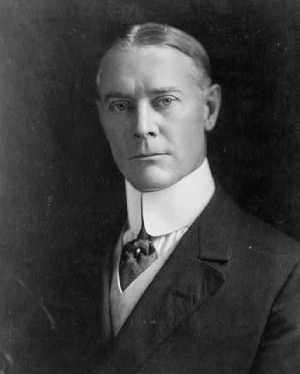 SKC Films Library |
| SKC Films Library >> American History >> United States: General History and Description >> Early 20th Century, 1901-1960 >> Individual Biography, A-Z |
| Albert Jeremiah Beveridge U.S. Senator
Albert Jeremiah Beveridge was born on a farm in Highland County, Ohio, on October 6, 1862. In 1865, his family moved to a farm in Moultree County, Illinois. His family didn't have a lot of money, and by age fourteen he was working as a railroad hand; he later became manager of a logging crew. Despite having to work for a living while still young, Beveridge was able to get a good education, and was able to secure admission to Asbury College (now DePauw University), from which he graduated in 1885. He was admitted to the Indiana Bar in 1887, and took up a civil practice in Indianapolis. Politician Beveridge won a reputation as a Republican campaign orator when he stumped for James G. Blaine's 1884 presidential campaign. His oratorical skills were also put to use for Benjamin Harrison's campaign in 1892, and for William McKinley's in 1896. Beveridge was elected to the U.S. Senate in 1899, and re-elected in 1905. During his first term, he was known as an ardent champion of American imperialism, which to Beveridge meant taking full advantage of the territories won as a result of the Spanish-American War. By his second term, however, Beveridge had shifted his focus to domestic issues. As a member of the reformist wing of the Republican Party, he drafted the meat inspection bill, fought for federal legislation limiting child labor, advocated an expert tariff commission, and spoke and voted against the Payne-Aldrich Tariff. He lost his bid for a third term in 1910, primarily due to deep divisions within the Republican Party. In 1912, Beveridge joined Theodore Roosevelt's Progressive Party, and made the keynote speech at the Progressive National Convention in Chicago. As the Progressive candidate for Governor of Indiana that same year, he received more votes than his Republican opponent, but lost to the Democratic candidate. His 1916 bid to regain his Senate seat as a Progressive also failed. Roosevelt put an end to the Progressive Party when he refused to run for President in 1916, and Beveridge rejoined the Republican Party. That same year, he actively supported the presidential candidacy of Charles Evans Hughes. Although he was now a Republican, he supported Democrat Woodrow Wilson's anti-interventionist stance in World War I, as well as many of Wilson's domestic policies, and spoke out against the suppression of political dissidents after the U.S. entered war. He did not, however, support American participation in the League of Nations. Beveridge made his last bid for political office in 1922, when he won the Republican nomination for the U.S. Senate, but lost the general election. Author In addition his political reputation, Beveridge also had a reputation as an accomplished historian. His writings include: The Russian Advance (1903), a study of international politics; What Is Back of the War (1915), a collection of a series of interviews with European leaders; and, the four-volume Life of John Marshall (1917-1919), which won the Pulitzer Prize in 1920. After completing his work on Marshall, Beveridge began a study of Abraham Lincoln, but had only completed two volumes before his death, in Indianapolis, on April 27, 1927. Although incomplete, Abraham Lincoln, 1809-1858 was published in 1928. PRINT SOURCE WEB SOURCE SEE ALSO |
| SKC Films Library
>> American History
>> United
States: General History and Description >> Early 20th Century, 1901-1960 >> Individual Biography, A-Z This page was last updated on October 05, 2017. |
